Machine learning engineers are the architects behind intelligent systems that can learn and make decisions. They design algorithms and models that allow computers to process and analyze vast amounts of data, enabling automation and predictive capabilities.
Machine learning engineering skills include proficiency in programming languages like Python and R, a strong understanding of algorithms and data structures, and the ability to work with large datasets. Additionally, skills such as critical thinking and collaboration are important for success in this role.
Candidates can write these abilities in their resumes, but you can’t verify them without on-the-job Machine Learning Engineer skill tests.
In this post, we will explore 8 essential Machine Learning Engineer skills, 9 secondary skills and how to assess them so you can make informed hiring decisions.
Table of contents
8 fundamental Machine Learning Engineer skills and traits
The best skills for Machine Learning Engineers include Statistical Analysis, Machine Learning Algorithms, Programming Proficiency, Data Wrangling, Deep Learning, Model Evaluation, Big Data Technologies and Neural Networks.
Let’s dive into the details by examining the 8 essential skills of a Machine Learning Engineer.
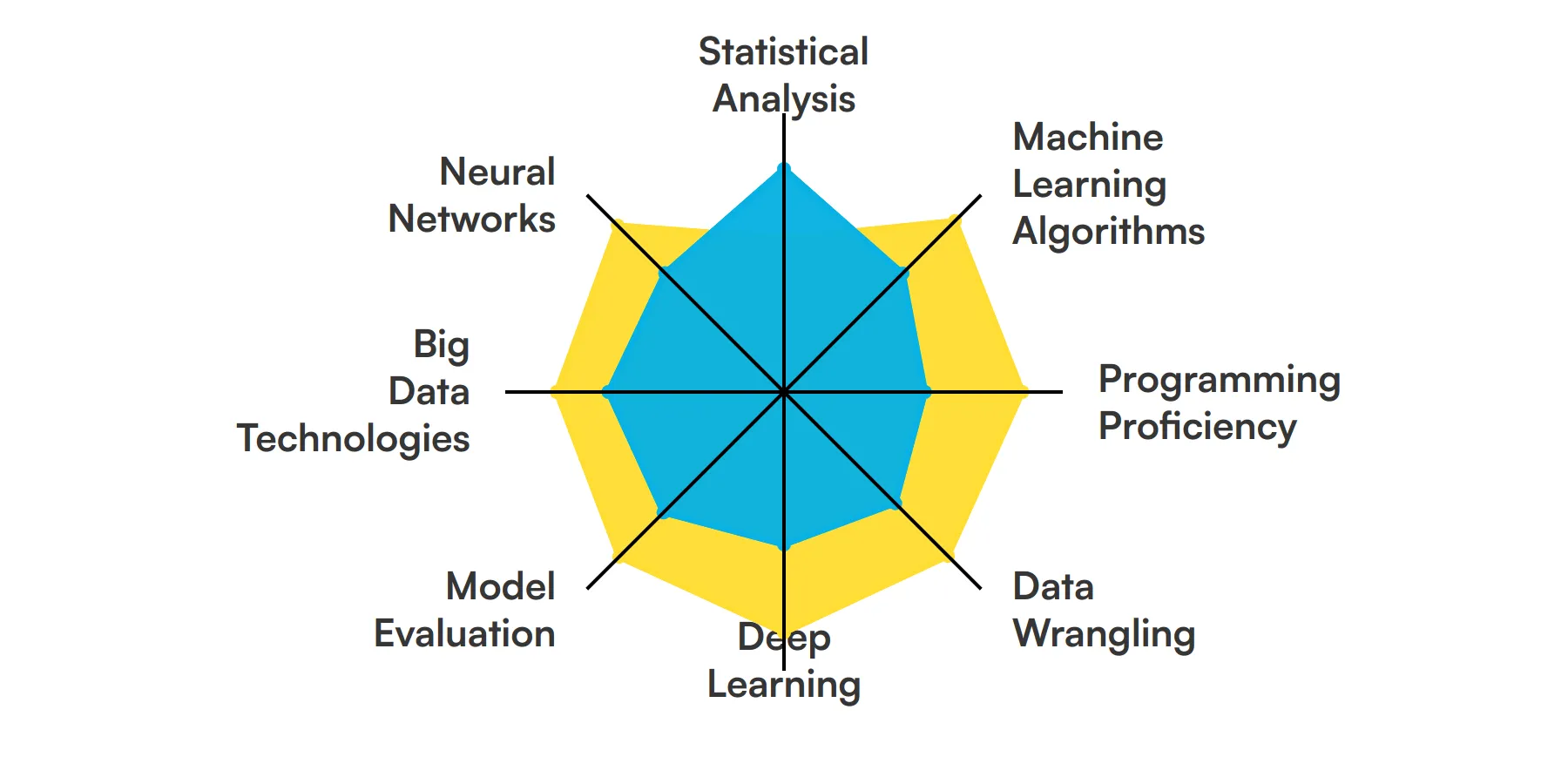
Statistical Analysis
Statistical analysis is fundamental for a Machine Learning Engineer as it allows them to understand and interpret data effectively. This skill is used to make informed decisions about which algorithms to use and how to tune them, ensuring the models are both accurate and reliable.
Check out our guide for a comprehensive list of interview questions.
Machine Learning Algorithms
Knowledge of various machine learning algorithms such as supervised and unsupervised learning is crucial for building effective models. A Machine Learning Engineer uses this skill to select and implement the right algorithm based on the problem at hand and the nature of the data.
Programming Proficiency
Proficiency in programming languages like Python or R is necessary for implementing machine learning models. This skill allows the engineer to write clean, efficient code that can process large datasets and perform complex calculations.
Data Wrangling
Data wrangling involves cleaning and unifying complex data sets for analysis. A Machine Learning Engineer uses this skill to prepare data in a way that enhances the accuracy of the models developed.
Deep Learning
Deep learning is a subset of machine learning that mimics the workings of the human brain in processing data. This skill is particularly useful for tasks like image and speech recognition, which are common in many advanced ML projects.
Model Evaluation
Evaluating the performance of machine learning models is key to ensuring their effectiveness. This involves using various metrics to test accuracy, precision, recall, and other relevant performance indicators.
Big Data Technologies
Familiarity with big data technologies like Hadoop, Spark, and others is important for handling and processing large volumes of data. This skill helps a Machine Learning Engineer manage data at scale, which is crucial for training robust models.
For more insights, check out our guide to writing a Big Data Engineer Job Description.
Neural Networks
Understanding neural networks is essential for implementing complex models that require deep learning. This skill allows Machine Learning Engineers to tackle more complex problems with higher accuracy.
9 secondary Machine Learning Engineer skills and traits
The best skills for Machine Learning Engineers include Software Engineering, Cloud Computing, Data Visualization, Version Control, Containerization, Automated Testing, Agile Methodologies, Database Management and Ethical AI.
Let’s dive into the details by examining the 9 secondary skills of a Machine Learning Engineer.
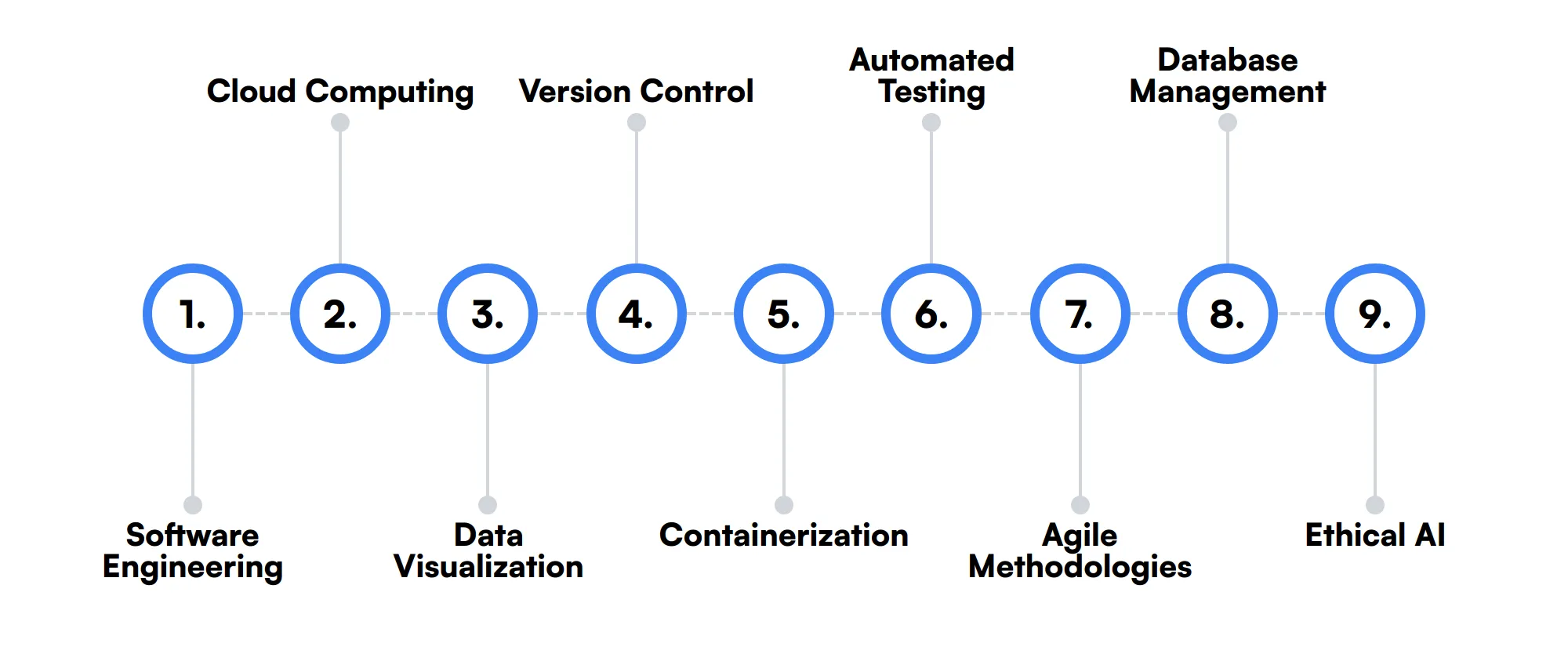
Software Engineering
Good software engineering practices are necessary to ensure that machine learning systems are scalable, maintainable, and integrate well with existing systems.
Cloud Computing
Knowledge of cloud services like AWS, Azure, or Google Cloud is beneficial for deploying machine learning models at scale, allowing for flexible and efficient resource management.
Data Visualization
Data visualization skills help in presenting data insights effectively. This is useful for communicating findings to stakeholders who may not have a technical background.
Version Control
Using version control systems such as Git helps in managing project versions and collaborating with other developers, which is common in large-scale machine learning projects.
Containerization
Skills in containerization technologies like Docker and Kubernetes are valuable for creating reproducible environments and deploying machine learning models seamlessly across different platforms.
Automated Testing
Automated testing ensures that machine learning applications are reliable and perform as expected even as changes are made to the codebase.
Agile Methodologies
Understanding agile methodologies can help Machine Learning Engineers work more effectively in teams, adapt to changing project requirements, and deliver results efficiently.
Database Management
Proficiency in database management ensures that data is stored, accessed, and managed efficiently, which is crucial for feeding the right data into machine learning models.
Ethical AI
Awareness of ethical considerations in AI helps ensure that machine learning solutions are developed responsibly, promoting fairness and avoiding bias in automated decisions.
How to assess Machine Learning Engineer skills and traits
Assessing the skills and traits of a Machine Learning Engineer can be a challenging task. With a diverse set of competencies ranging from statistical analysis to deep learning, it's important to have a structured approach to evaluate these professionals effectively.
Resumes and certifications can provide a snapshot of a candidate's background, but they don't reveal the depth of their expertise or their ability to apply these skills in real-world scenarios. Skills-based assessments are a reliable way to measure a candidate's true capabilities.
For instance, Adaface on-the-job skill tests can help you identify top talent by focusing on practical knowledge and problem-solving abilities. This approach not only improves the quality of hires by 2x but also reduces screening time by 85%.
When assessing Machine Learning Engineers, consider their proficiency in key areas such as machine learning algorithms, programming, data wrangling, and model evaluation. These skills are fundamental to their role and can be effectively evaluated through targeted assessments.
Let’s look at how to assess Machine Learning Engineer skills with these 6 talent assessments.
Statistics Test
Our Statistics Test evaluates a candidate's understanding and proficiency in statistical concepts and analysis. It covers topics such as statistical methods, data analysis, numerical reasoning, and quantitative aptitude.
The test assesses their understanding of statistics fundamentals, inference (p-values and confidence intervals), data sampling, and regression. It also covers sampling distributions, exploratory data analysis, and non-parametric statistics.
Successful candidates demonstrate strong skills in probability and data analysis, showcasing their ability to handle various statistical challenges.
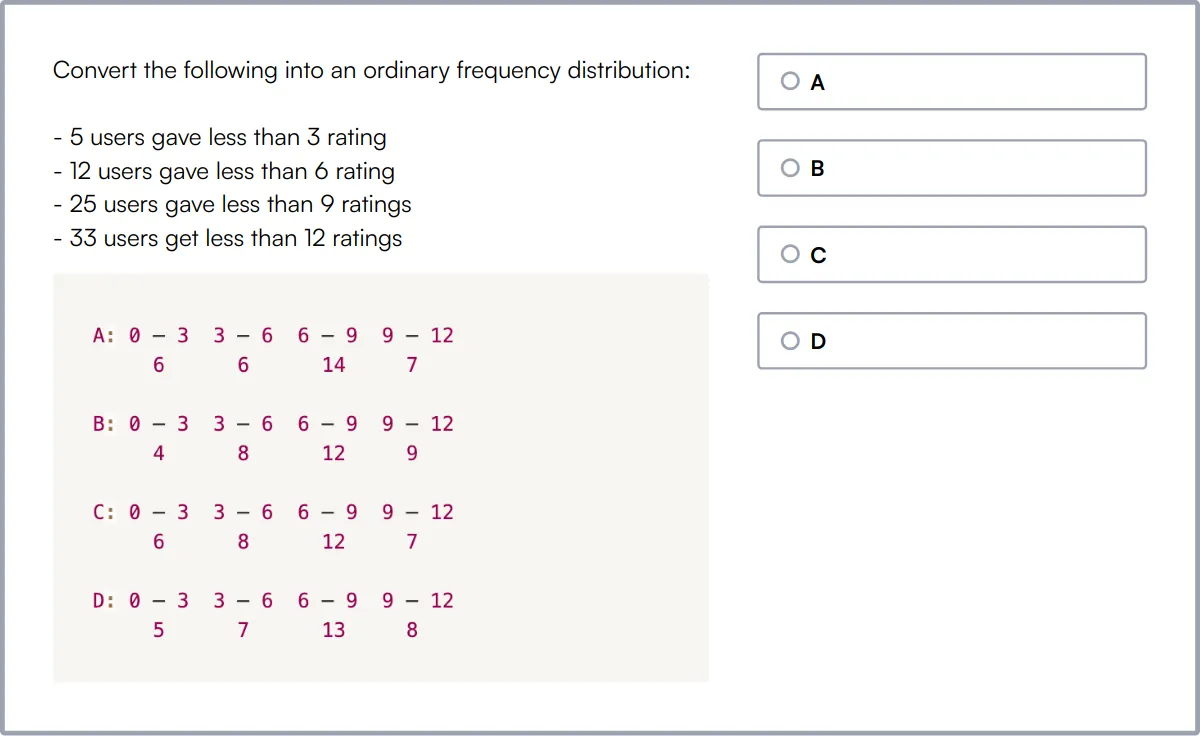
Machine Learning in AWS Online Test
The Machine Learning in AWS Online Test evaluates a candidate's knowledge and understanding of machine learning concepts and their application in the Amazon Web Services (AWS) environment.
This test covers machine learning in AWS, data science, and data analysis. It also includes Kubernetes and AWS DevOps.
Candidates are assessed on their ability to leverage AWS services for implementing machine learning solutions, with a focus on Python and its libraries.
Python Online Test
The Python Online Test evaluates a candidate's ability to use Python data structures, manage files, handle exceptions, and structure code using Object-Oriented Programming principles.
The test covers Python fundamentals (variables, loops, functions), data structures (lists, tuples, dictionaries, sets), and errors and exceptions handling. It also includes scripting and web scraping, in-built functions and modules, and functional programming.
Successful candidates demonstrate proficiency in debugging tools and accessing and manipulating databases.
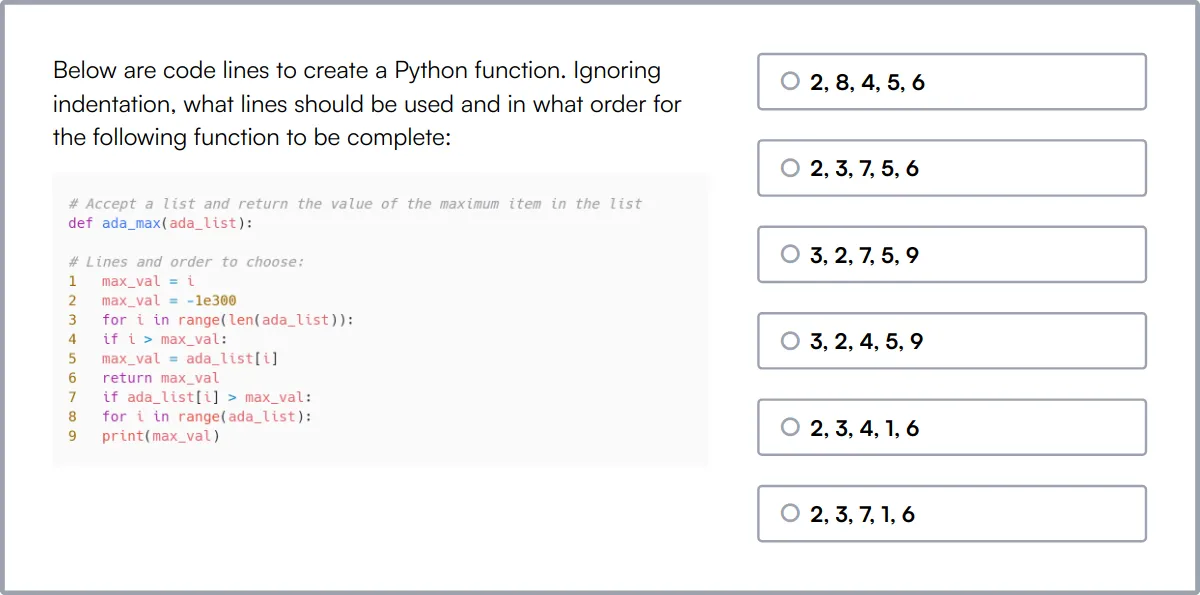
Data Wrangling Test
The Data Wrangling Test evaluates a candidate's skills in cleaning, transforming, and organizing raw data into a structured format suitable for analysis.
The test covers data extraction, data parsing, data integration, and quality assessment. It also includes data validation, data modeling, and data interpretation.
Candidates are assessed on their ability to perform data analysis and handle various data wrangling tasks.
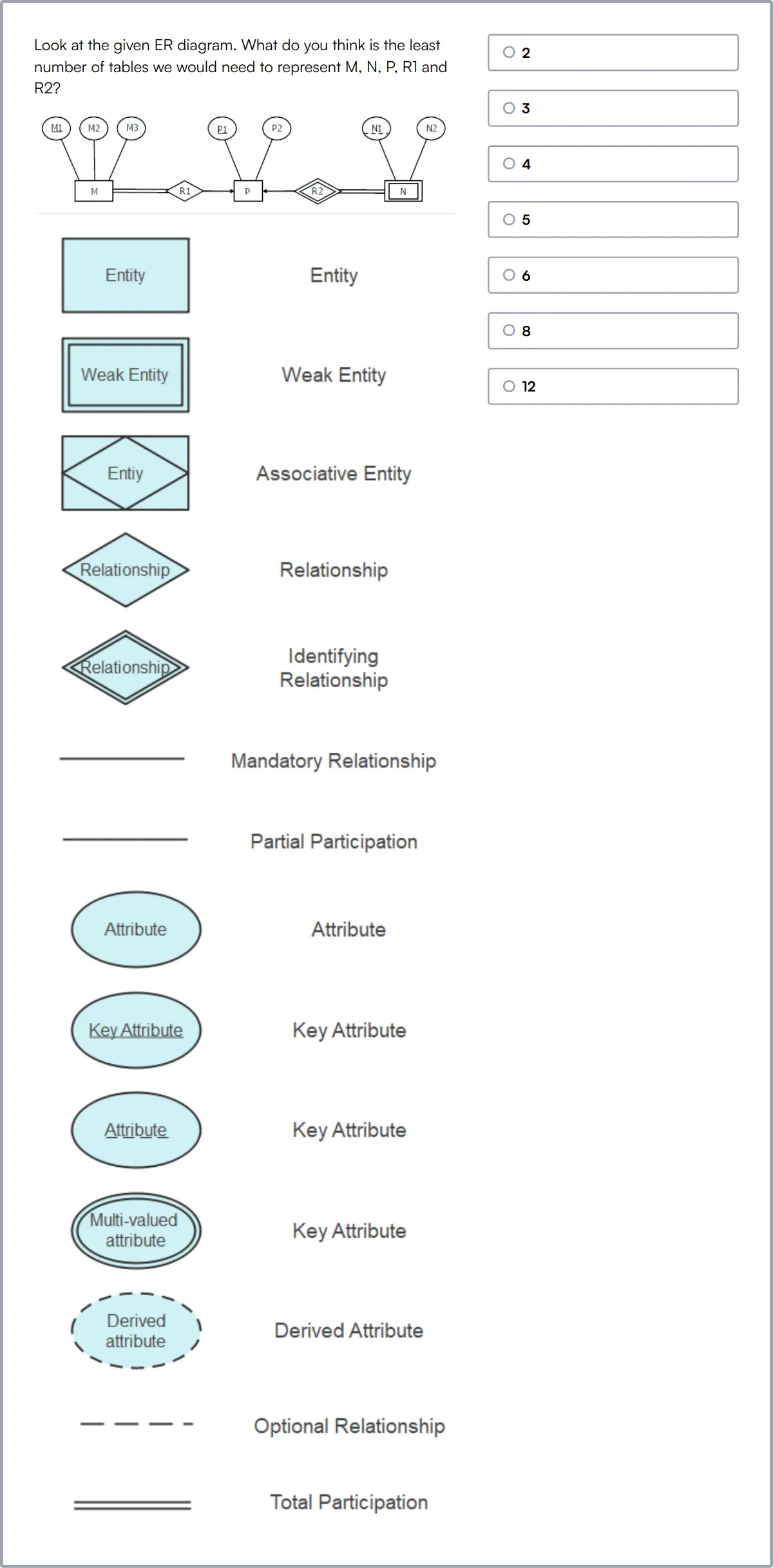
Deep Learning Online Test
The Deep Learning Online Test evaluates a candidate's understanding of core deep learning concepts like activation functions, backpropagation, RNNs, and CNNs.
The test covers neural networks, data normalization, cost functions and activation functions, and backpropagation. It also includes convolutional neural networks, recurrent neural networks, and generative adversarial networks.
Candidates are assessed on their ability to apply deep learning algorithms to use cases like computer vision, image recognition, and text classification.
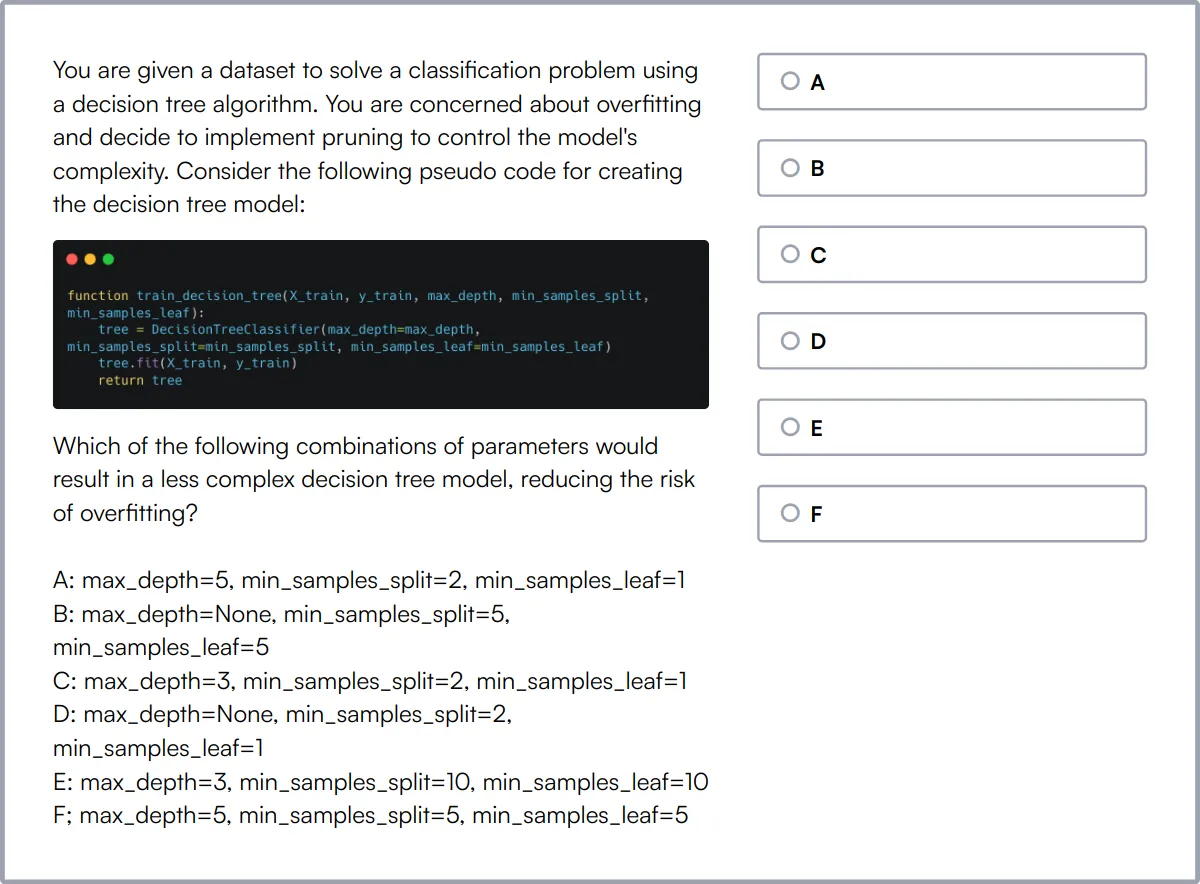
Hadoop Online Test
The Hadoop Online Test uses scenario-based MCQ questions to evaluate candidates' ability to install Hadoop clusters on the cloud and run optimized MapReduce jobs.
The test covers core Hadoop architecture (HDFS, YARN, MapReduce), writing efficient Hive and Pig queries, and publishing data to clusters. It also includes handling streaming data and working with different file formats.
Candidates are assessed on their ability to troubleshoot and monitor Hadoop clusters, showcasing their knowledge of the Hadoop framework.
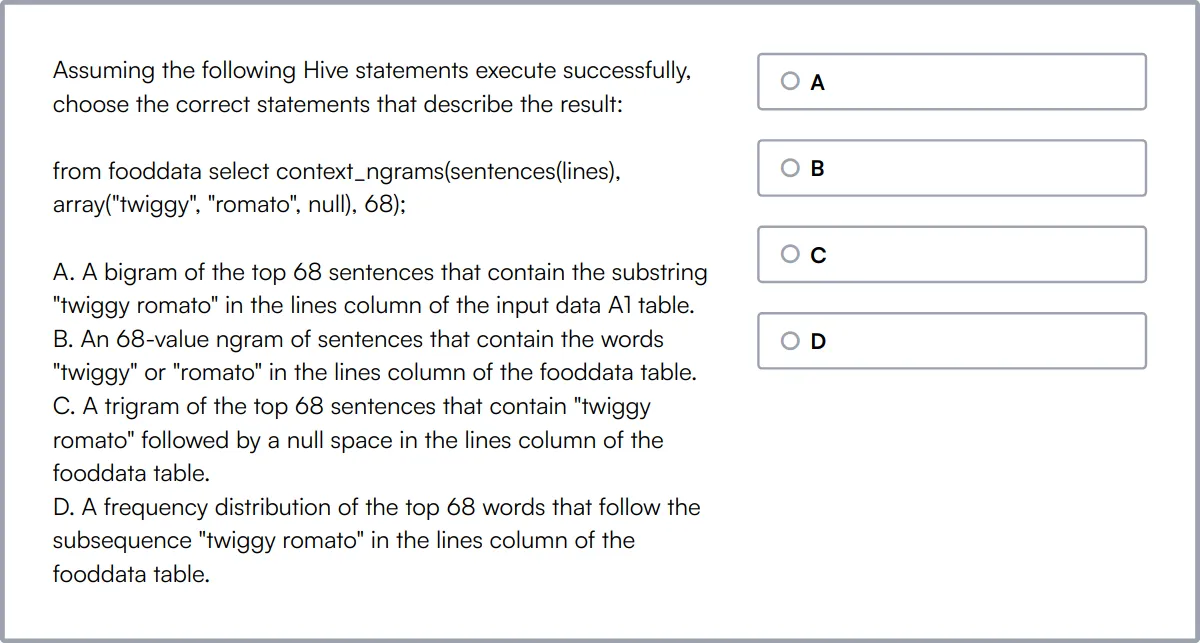
Summary: The 8 key Machine Learning Engineer skills and how to test for them
| Machine Learning Engineer skill | How to assess them |
|---|---|
| 1. Statistical Analysis | Evaluate understanding of statistical methods and their application in data analysis. |
| 2. Machine Learning Algorithms | Test knowledge of various algorithms and their appropriate use cases. |
| 3. Programming Proficiency | Assess coding skills in languages like Python, R, or Java. |
| 4. Data Wrangling | Check ability to clean, transform, and prepare data for analysis. |
| 5. Deep Learning | Gauge expertise in neural networks and deep learning frameworks. |
| 6. Model Evaluation | Determine ability to assess model performance using appropriate metrics. |
| 7. Big Data Technologies | Evaluate familiarity with tools like Hadoop, Spark, or Kafka. |
| 8. Neural Networks | Test understanding of neural network architectures and training processes. |
Machine Learning in AWS Online Test
Machine Learning Engineer skills FAQs
What statistical analysis skills should a Machine Learning Engineer have?
A Machine Learning Engineer should be proficient in hypothesis testing, regression analysis, and probability theory to interpret data and validate models.
How can I assess a candidate's proficiency in machine learning algorithms?
Ask candidates to explain and implement common algorithms like decision trees, SVMs, and k-means clustering. Evaluate their understanding of when and why to use each algorithm.
What programming languages are essential for a Machine Learning Engineer?
Python and R are commonly used. Proficiency in libraries like TensorFlow, PyTorch, and scikit-learn is also important.
Why is data wrangling important for Machine Learning Engineers?
Data wrangling is crucial for cleaning and preparing raw data, which directly impacts the quality and performance of machine learning models.
How do you evaluate a candidate's deep learning skills?
Ask them to build and train neural networks using frameworks like TensorFlow or PyTorch. Evaluate their understanding of concepts like backpropagation and gradient descent.
What big data technologies should a Machine Learning Engineer be familiar with?
Familiarity with Hadoop, Spark, and NoSQL databases like MongoDB is important for handling large datasets.
How important is cloud computing for Machine Learning Engineers?
Cloud platforms like AWS, Google Cloud, and Azure are essential for scalable model training and deployment.
What role does ethical AI play in the responsibilities of a Machine Learning Engineer?
Ethical AI involves ensuring fairness, transparency, and accountability in AI models. Engineers should be aware of biases and work to mitigate them.

40 min skill tests.
No trick questions.
Accurate shortlisting.
We make it easy for you to find the best candidates in your pipeline with a 40 min skills test.
Try for freeRelated posts
Free resources



